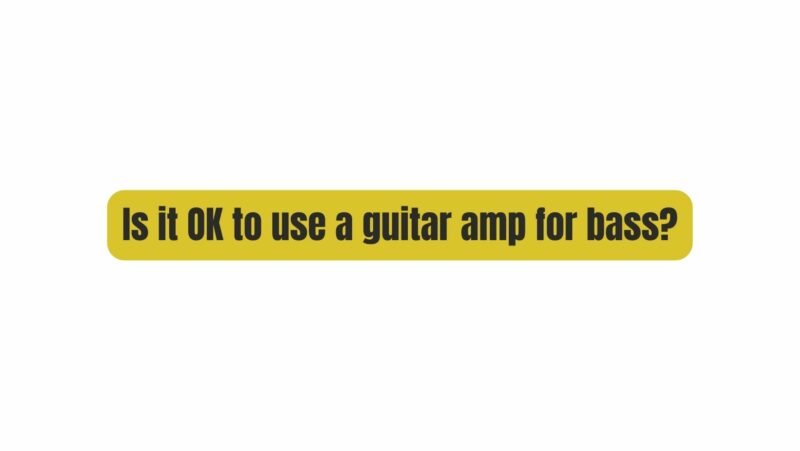In the world of music, equipment choices can significantly impact your sound and performance. For bassists, finding the right amplifier is a critical decision. While dedicated bass amplifiers exist, some musicians wonder if it’s okay to use a guitar amp for bass. In this comprehensive article, we will explore the possibilities, advantages, challenges, and considerations of using a guitar amplifier for bass.
Understanding Guitar Amps and Bass Amps
Before we dive into the topic, let’s establish a fundamental understanding of guitar amplifiers and bass amplifiers.
- Guitar Amplifiers: Guitar amplifiers are designed to amplify the sound of an electric guitar. They come in various types, including tube, solid-state, and modeling amps, and are characterized by their unique tonal characteristics and effects. Guitar amps are optimized for the mid-range frequencies associated with the guitar’s tone.
- Bass Amplifiers: Bass amplifiers, often referred to as bass amps, are specifically designed to amplify the lower frequencies produced by bass guitars. They are engineered to provide clean, powerful, and deep bass response, making them ideal for bassists seeking low-end punch and clarity.
Can You Use a Guitar Amp for Bass?
The question of whether it’s okay to use a guitar amp for bass doesn’t have a simple yes or no answer. It depends on various factors, and both approaches come with advantages and limitations. Let’s explore the possibilities:
Advantages of Using a Guitar Amp for Bass:
- Cost-Effective: If you already own a guitar amp and are on a tight budget, using it for bass can save you money. It eliminates the need to invest in a separate bass amplifier.
- Portability: Guitar amps tend to be lighter and more portable than bass amps, which can be advantageous for musicians who need to transport their gear frequently.
- Tonal Experimentation: Some bassists use guitar amps intentionally for the unique tonal qualities they offer. Certain guitar amps can produce gritty, distorted, or overdriven bass tones that suit specific musical styles.
Challenges and Considerations:
- Frequency Range: The primary limitation of using a guitar amp for bass is its limited frequency response. Guitar amps are designed for mid-range frequencies and may struggle to reproduce the deep, low-end frequencies of a bass guitar accurately.
- Power Handling: Bass guitars produce more significant low-frequency energy compared to electric guitars. Using a guitar amp for bass may overload the amplifier, leading to distortion and potential damage.
- Speaker Size: Guitar amplifiers typically feature smaller speakers compared to bass amps. Bass speakers are designed to handle the lower frequencies effectively. Using a guitar amp with a small speaker for bass may result in poor bass response and speaker damage.
- Tonal Compromises: While some bassists embrace the unique tonal characteristics of guitar amps, others find that these amps lack the clarity, depth, and punch necessary for a solid bass foundation.
Tips for Using a Guitar Amp for Bass:
If you decide to use a guitar amp for bass, here are some tips to make the most of the situation:
- Monitor Volume: Keep an eye on the amplifier’s volume level. Avoid pushing it to the point of distortion or speaker damage. If you notice any distortion, reduce the volume immediately.
- Use a Smaller Speaker Cabinet: If your guitar amp has a speaker output, consider connecting it to a smaller speaker cabinet designed for bass. This can help improve bass response and reduce the risk of damaging the amp’s built-in speaker.
- Tonal Adjustments: Experiment with the amplifier’s tone controls to find a suitable bass sound. You may need to make significant adjustments to achieve a balanced tone.
- Consider Pedals: Bassists using guitar amps often rely on effects pedals, such as equalizers and overdrive/distortion pedals, to shape their bass tone and compensate for any tonal deficiencies.
Conclusion
In conclusion, using a guitar amp for bass is possible, but it comes with advantages, limitations, and considerations. Whether it’s okay to use a guitar amp for bass depends on your specific needs, budget, and tonal preferences.
While using a guitar amp for bass can be cost-effective and offer tonal experimentation opportunities, it may not provide the same depth, power, and clarity as a dedicated bass amplifier. Bass amps are specifically designed to handle the unique requirements of bass guitars, including the reproduction of deep, resonant low frequencies.
Ultimately, the choice should align with your musical goals and budget. If you decide to use a guitar amp for bass, take precautions to avoid overloading the amplifier and monitor its performance carefully. By understanding the advantages and limitations, you can make an informed decision that best suits your bass playing style and sound preferences.


